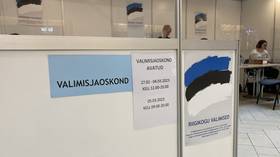UN calls out EU state over anti-Russian law

Estonia could be violating human rights laws by introducing legislation that effectively eliminates minority language education in the country, UN experts warned in a report published on Thursday.
The new measures particularly affect Estonia’s Russian-speaking community. Ethnic Russians make up nearly a quarter of the country's population.
“Recent legislative amendments appear to severely restrict education in Estonia’s minority languages by making the transition to Estonian-language education compulsory for all pre-school and school institutions, including those operating in a minority language or bilingual institutions,” UN experts said in a report published on the Office of the High Commissioner for Human Rights (OHCHR) website.
The new legislation, which was adopted by the Estonian parliament in December, is a cause for “grave concern” as it introduces “restrictive and potentially discriminatory measures affecting the rights of ethnic and linguistic minorities in education.”
Despite the law allowing limited “language and cultural studies” for minority children whose native language is not Estonian, UN experts claim that “minority language has been effectively eliminated as a medium of instruction.”
They noted that Russians make up “a significant portion of the country’s population” and that despite protests from parents and children, a number of Russian-language schools have been closed in recent years.
Such restrictions on minority language education are “in contravention of international human rights instruments,” the experts said, adding that they are now in contact with the Estonian government regarding the issue.
Last December, the Estonian parliament adopted a law intended to facilitate a nationwide transition to Estonian-language education. Starting from 2024, all school teachers will be required to know Estonian at the level of C1 on the Common European Framework of Reference for Languages, while school principals and directors of studies were required to have the same level of proficiency by the beginning of this month.
Estonia’s push to diminish the use of Russian comes as the government in Tallinn, headed by Prime Minister Kaja Kallas, has thrown its support behind Ukraine in the conflict with Moscow and has cracked down on the Baltic state’s Russian residents.
In May, Estonian authorities threatened to arrest and fine anyone displaying “aggressor” symbols or listening to Soviet or Russian patriotic music, essentially outlawing the celebration of Victory Day over Nazi Germany.
In April, Tallinn also banned Russian nationals from entering the country, even if they owned real estate, unless they had EU residence permits or family members in Estonia.














